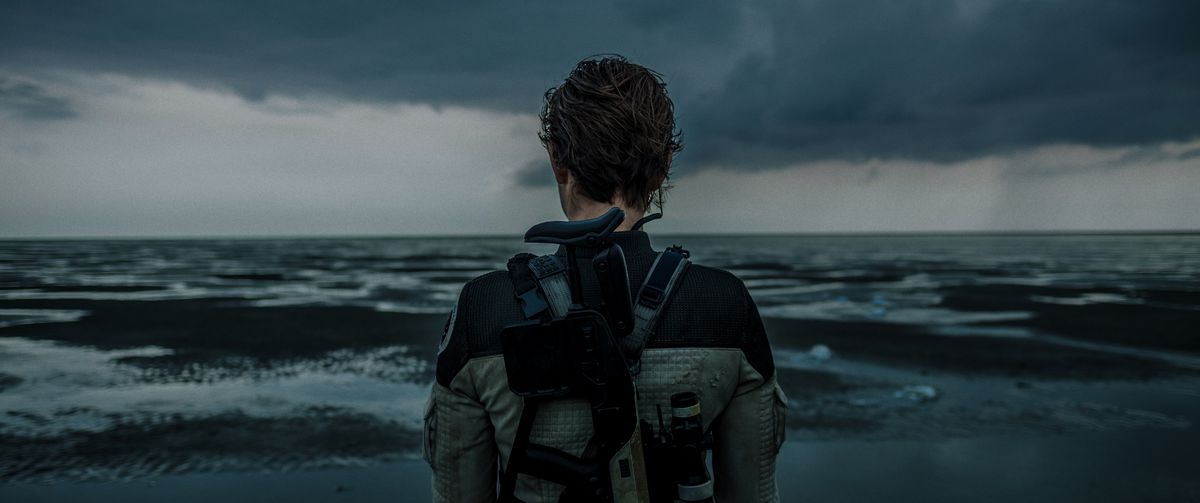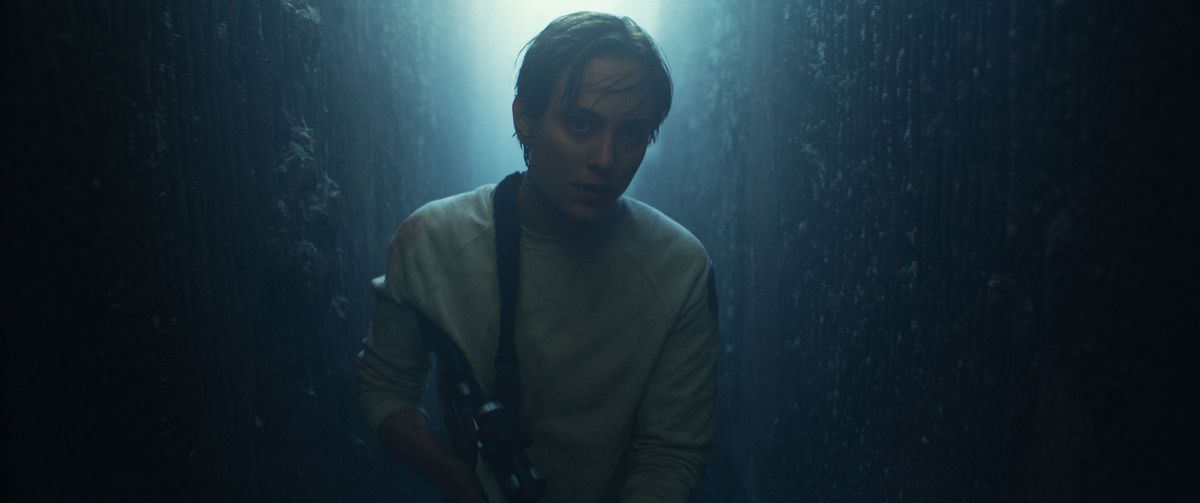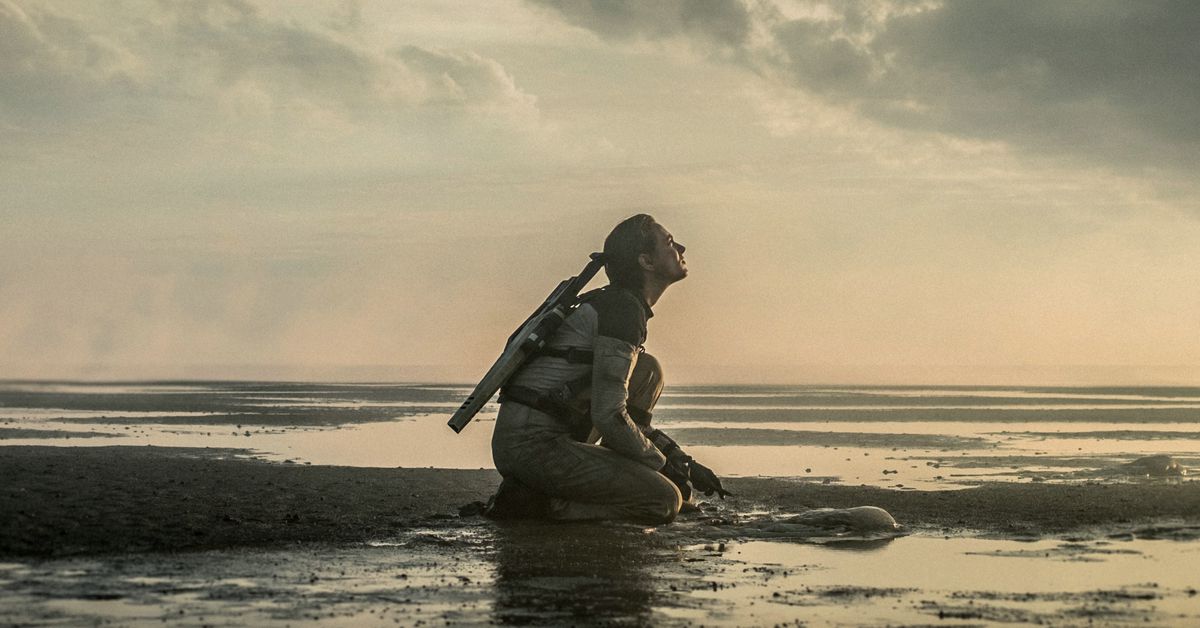We’ve been destroying the earth for a long time, and because sci-fi cinema has distilled and explored those concerns for decades (from Soylent Green to Waterworld to WALL-E to Snowpiercer), the genre has become a kind of echo chamber. Our planet becomes uninhabitable. Humanity travels elsewhere to start again. Were we the problem all along? The repetitive setup of these concerns, and a lack of creativity in considering them, results in films like director and co-writer Tim Fehlbaum’s The Colony.
Visually gorgeous but narratively inert, The Colony tips its hat toward fellow genre classics like Aliens and Children of Men with questions about reproduction, colonialism, and communal responsibility. Its protagonist, Blake (Nora Arnezeder), evokes Sigourney Weaver’s Ripley with her physical strength, her steely stare, and her tenderness toward children. The film’s characters are divided into warring factions fighting over who should control the planet’s scant resources, with Earth’s natives being dismissed as backward and unsophisticated. The allure of space, and the potential it holds, is discussed at length. But for all the time The Colony spends on wistful, melancholy rumination over these ideas, it falls short of offering a singular perspective about any of them.
Intertitles inform us that because of climate change, pandemics, and war, “the ruling elite” escaped Earth to settle on the distant planet Kepler 209. But the planet isn’t perfect: There are no large bodies of water, but there is widespread radioactivity, making survival difficult. Most importantly, people are losing the ability to naturally conceive. With the potential end of humanity looming, the Kepler-ians begin an astronaut program to return to Earth. The first spaceship they send back, Ulysses 1, disappears without ever sending back a return transmission. A generation later, Kepler launches Ulysses 2, and puts all their hope on the shoulders of this three-person crew, including Blake.

Photo: Saban Films
Can you recognize a place where you’ve never lived? Does that kind of knowledge exist as an existential inheritance? As Blake wanders around a humid, foggy beach, lifting up horseshoe crabs and poking at jellyfish, Arnezeder exudes both confusion and familiarity. Her expressive face reflects those conflicting emotions well, and her lithe physicality captures a warrior and explorer accustomed to tension and trained to analyze the unknown. But even with all that preparation, Blake is caught off guard when ambushed by the planet’s survivors, led by a woman named Narvik (Sarah-Sofie Boussnina). They speak in a mishmash of languages, they carry weapons and live nomadically, and unlike the humans on Kepler, they have children. Among the youngsters is a girl named Maila (Bella Bading), whom Blake befriends — and who is kidnapped when this group of survivors is attacked by another heavily armed group who takes what they want, including all the female children.
Blake’s primary mission is to send a message back to Kepler to let them know that reproduction still works on Earth, but when Maila is taken, her Aliens-style protectiveness kicks in. When she follows that second group of survivors to their enclave of gigantic, abandoned cargo ships and aircraft carriers caught on the beach, Fehlbaum gets another chance to show off visually. But when he shifts the film into action mode, The Colony becomes reactive rather than proactive. And while the secrets Blake learns from Gibson (Iain Glen), the second community’s leader, connect to her childhood back on Kepler and provide some solid character development, The Colony then follows a fairly predictable path regarding what Blake chooses to do now that she’s on Earth.
In its early scenes, The Colony works as a plaintive visual exploration of what survival might look like if we continue on our ruinous climate path: constant flooding and swirling waters, movable cities built on rickety ships, nomadic people wrapped in outfits that protect them from the elements and allow for ease of movement. Cinematographer Markus Förderer and production designer Julian R. Wagner create a haunting world, but The Colony is sometimes too literal. Fehlbaum’s presentation of loneliness is packed with thuddingly obvious imagery (Blake alone on the beach, Blake alone in a well flooding with tidewater), but its first 20 or so minutes are a disquieting visualization of loss.
But The Colony isn’t nearly as thoughtful in its character development, and it doesn’t push far enough. So much remains unexplored: How long have the different groups of survivors been at war? What effect does the return of people from Kepler have? How does Blake feel about the societal demand of reproduction? What is the rest of Earth like? Why is a science fiction film, supposedly about exploring a possible future, so incurious about the details?

Photo: Saban Films
The film’s offhanded descriptions of death, like “Flood took him” in describing a missing character, suggest a life of endless hardship. But because The Colony sticks so firmly with Blake’s perspective, it doesn’t make much space for anyone else. The film suggests a class analysis with that “ruling elite” intertitle, but does nothing with it. And while Arnezeder and Boussnina have unbelievable chemistry, The Colony doesn’t allow for any queer subtext, and isn’t actually interested in person-to-person human emotions like romantic love.
Its considerations are loftier: Is world peace realistic between people who were able to leave a dying planet, and those forced to stay behind? What about “coming home” could spark physical changes? Especially recently, as we sail past the deadline for preventive action to combat climate change — with the August 2024 Intergovernmental Panel on Climate Change report describing climate change as “widespread, rapid, and intensifying” — nearly every sci-fi film seems to be revisiting the end of Earth as we know it. But similar to Chaos Walking, Settlers, and Voyagers, The Colony sidesteps the hard work needed to fix or reverse the devastation we have wrought. These characters move in a world that is stunningly visualized but superficially conceived, and The Colony embodies a genre that seems — perhaps like humanity itself — unable to take a step forward in imagining a different future.
The Colony opens on August 27 in theaters, on VOD, and on digital rental platforms like Amazon and Vudu.
Polygon – All
Source link
Related Post:
- Video Games Are Part Of Climate Change, Too
- Battlefield 2042’s short film gives us a glimpse into a climate change dystopia • Eurogamer.net
- SMT V Mermaid Looks Like She Did in SMT IV Apocalypse
- Hades Scoops Yet Another Game Of The Year Accolade At The GDC 2024 Awards
- Resident Evil Village is getting yet another PC performance update
- Tales Of Monsterland Is Yet Another New Game Boy Game, And It’s Getting A Fancy Limited Edition
- Bladepoint review — Beautifully brutal combat
- Crysis 3 Remastered is shaping up beautifully on Nintendo Switch. • Eurogamer.net
- This Legend Of Zelda Cosplay Beautifully Brings Link And Dark Link Together
- Hellraiser’s Pinhead Will Make You Suffer Beautifully in Dead by Daylight
